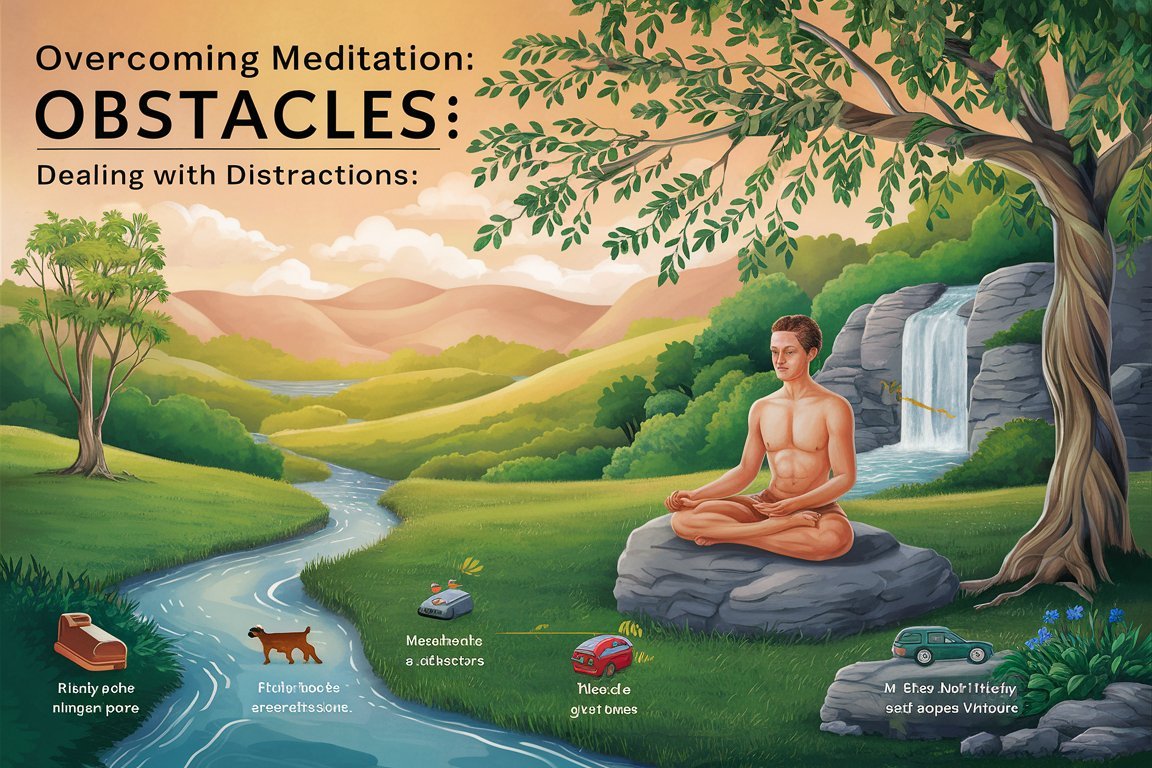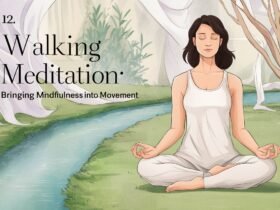Overcoming Meditation Obstacles: Dealing with Distractions
Hey there, my curious and adventurous friends of 2024! It’s your favorite mindfulness explorer,H.l.Morgan, here to take you on a journey into the world of overcoming meditation obstacles, specifically dealing with distractions. Now, I know what you might be thinking – “Distractions? Isn’t meditation supposed to be all about peace and quiet?” But trust me, distractions are a totally normal part of the meditation process, and learning how to deal with them is an important skill that can help you in all areas of your life!

Today, we’re going to put on our explorer hats and discover what meditation distractions are all about, why they happen, and how you can learn to work with them in a way that feels fun, easy, and totally empowering. But before we dive in, let me make one thing clear – this is not about beating yourself up or feeling like you’re doing something wrong if you get distracted during meditation. It’s simply about learning to approach distractions with curiosity, kindness, and a sense of adventure.
So, are you ready to join me on this meditation obstacle-busting adventure? Let’s go!
What are Meditation Distractions?
First things first, let’s talk about what meditation distractions actually are. Meditation distractions are anything that pulls your attention away from your meditation practice, whether it’s a thought, a feeling, a sensation in your body, or something happening in your environment.
Some common examples of meditation distractions include:
- Thoughts about the past or future, like worrying about an upcoming test or replaying a conversation from earlier in the day
- Physical sensations, like an itch, a pain, or a tickle in your nose
- Emotions, like feeling anxious, excited, or frustrated
- Sounds in your environment, like a dog barking or a car driving by
- Urges to do something else, like check your phone or get up and move around
The thing about meditation distractions is that they’re totally normal and inevitable. Our minds are designed to wander and get distracted, and trying to force them to be completely still and focused is like trying to hold a beach ball underwater – it’s just not going to happen!
So instead of trying to eliminate distractions altogether, the goal of meditation is to learn how to work with them in a way that feels kind, curious, and non-judgmental.
Why Do Meditation Distractions Happen?
So, why do meditation distractions happen in the first place? There are a few key reasons:
Our Minds are Designed to Wander
As I mentioned before, our minds are naturally designed to wander and get distracted. It’s just part of how our brains work! When we sit down to meditate, our minds are suddenly faced with a whole lot of open space and freedom, and they often take that as an invitation to start exploring and generating all sorts of thoughts and ideas.
This is totally normal and doesn’t mean that you’re doing anything wrong. In fact, it’s a sign that your mind is doing exactly what it’s supposed to do – processing information, making connections, and trying to make sense of the world around you.
We Live in a Distracting World
Another reason why meditation distractions happen is that we live in a world that’s full of distractions. From social media and smartphones to busy schedules and constant stimulation, our lives are often filled with things that pull our attention away from the present moment.
When we sit down to meditate, it’s like we’re suddenly hitting the pause button on all of that external stimulation, and our minds can feel a little bit lost or uncomfortable at first. It’s like they’re saying, “Hey, what’s going on here? Where did all the distractions go?”
We Have a Lot on Our Minds
Finally, meditation distractions happen because we often have a lot on our minds, whether it’s worries about the future, regrets about the past, or just a general sense of busyness and stress. When we sit down to meditate, all of those thoughts and feelings can suddenly come rushing to the surface, making it hard to focus on the present moment.
This is totally normal and doesn’t mean that you’re doing anything wrong. In fact, it’s a sign that you’re giving yourself the space and permission to actually feel and process all of those thoughts and emotions, rather than just pushing them away or ignoring them.
How to Deal with Meditation Distractions
So, now that we know what meditation distractions are and why they happen, how can we learn to deal with them in a way that feels kind, curious, and empowering? Here are a few key strategies:
Notice and Name Your Distractions
The first step in dealing with meditation distractions is simply to notice and name them when they arise. When you find your mind wandering or getting caught up in a thought or feeling, try to bring a sense of gentle awareness to what’s happening.
You might silently say to yourself something like, “Ah, there’s a thought about that math test coming up,” or “Oh, I’m feeling a little bit anxious right now.” The key is to notice and name your distractions without judgment or criticism, and to approach them with a sense of curiosity and openness.
Come Back to Your Anchor
Once you’ve noticed and named your distraction, the next step is to gently bring your attention back to your meditation anchor, whether it’s your breath, a mantra, or a specific sensation in your body.
This is where the real magic of meditation happens – in the moment of noticing that you’ve been distracted and choosing to come back to the present moment. Each time you do this, you’re strengthening your ability to focus, stay present, and work with distractions in a skillful way.
Be Kind to Yourself
As you’re working with meditation distractions, it’s important to remember to be kind and compassionate with yourself. Getting distracted during meditation is totally normal and doesn’t mean that you’re doing anything wrong or that you’re not cut out for meditation.
In fact, the moment of noticing that you’ve been distracted is actually a moment of mindfulness – you’ve brought awareness to what’s happening in the present moment, even if it’s not what you intended to focus on.
So instead of beating yourself up or getting frustrated when distractions arise, try to approach them with a sense of kindness and understanding. Remind yourself that distractions are a normal part of the meditation process, and that each time you notice and work with them, you’re building important skills that can support you in all areas of your life.
Make It a Game
Finally, one of the best ways to work with meditation distractions is to make it a game! Instead of seeing distractions as a problem or a failure, try to approach them with a sense of playfulness and curiosity.
You might imagine that your distractions are like little bubbles floating through your mind, and that each time you notice one, you get to gently pop it and come back to your anchor. Or you might picture your thoughts as leaves floating down a stream, and each time you notice one, you get to watch it drift away and return to the present moment.
The key is to find a way to work with distractions that feels fun, easy, and engaging, rather than like a chore or a struggle. The more you can approach your meditation practice with a sense of lightness and play, the more enjoyable and effective it will be.
Conclusion
So there you have it, my dear friends – a beginner’s guide to overcoming meditation obstacles and dealing with distractions! I hope this post has inspired you to approach your meditation practice with a sense of curiosity, kindness, and adventure, and to remember that distractions are a totally normal and essential part of the process.
Remember, meditation is not about achieving a state of perfect focus or stillness, but rather about learning to be present with whatever arises in the moment, whether it’s a thought, a feeling, or a sensation in your body. Each time you notice and work with a distraction, you’re building important skills that can support you in all areas of your life, from managing stress and emotions to improving focus and concentration.
So the next time you sit down to meditate and find your mind wandering or getting caught up in distractions, try to approach it with a sense of playfulness and curiosity. Notice and name your distractions, gently come back to your anchor, and remember to be kind and compassionate with yourself along the way.
And above all, remember that meditation is a journey, not a destination. There’s no such thing as a “perfect” meditation or a “bad” meditation – there’s just the practice of showing up, being present, and working with whatever arises in the moment.
So keep exploring, keep practicing, and keep bringing a sense of joy and adventure to your meditation journey. Who knows what amazing discoveries and insights await you along the way!









Leave a Reply